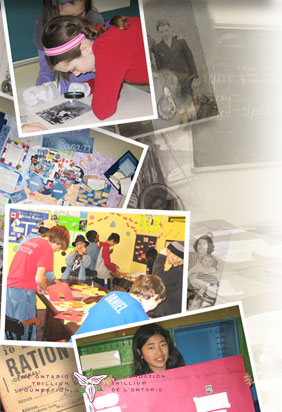Other Resources
Book List
Here is a list of other books that you may want to use for the Introductory Workshop, or as additional assigned reading for this project.
Oma's Quilt by Paulette Bourgeois and Stéphane Jorisch (Toronto: Kids Can Press, 2001)
The Family Tree Detective: Cracking the Case of Your Family's Story by Ann Douglas (Maple Tree Press, 1999)
Something from Nothing by Phoebe Gilman (Markham, Ontario: Scholastic Canada Ltd., 1992)
Coming to Canada: Building a Life in a New Land by Susan Hughes (Maple Tree Press, 2005)
Hana's Suitcase by Karen Levine (Toronto: Second Story Press, 2002)
The Great Ancestor Hunt: The Fun of Finding Out Who You Are by Lila Perl (Clarion Book, 1989)
The Keeping Quilt by Patricia Polacco (Aladdin, 2001 reprint)
Grandfather's Journey by Allen Say (Boston: Houghton Miffin Company, 1993)
Glossary of Terms
Artifact: a human-made object which gives information about the culture of its creator and users.
Caption: A title or explanation for a picture or illustration, such as in a newspaper or magazine.
Closed Questions: Questions that can be answered with a short or specific answer, such as with a 'yes' or 'no' or with some other fact (date, name, etc).
Discrimination: To be treated unfairly on the grounds of race, ethnicity, gender, class, age, religion or sexual orientation.
Emigration: The act of leaving one country or region to settle in another.
Genealogy: the study and tracing of family lineages.
History: An interpretation of the past; a branch of knowledge that records and explains past events.
Immigration: The movement of people between countries, usually for long-term or permanent residence.
Maternal Line / Paternal Line: The line of descent on a mother's / father's side.
Multiculturalism: The preservation of distinct cultural identities among varied groups within a unified society.
Open Questions: Questions that enable a person to speak without restriction about a subject. In general open questions allow for more description and/or detailed responses.
Oral History: Oral history is a way of gathering, preserving and interpreting the voices and memories of people, communities and participants in past events. (From the Oral History Association website).
Pull factors: In migration theory, the social, political, economic, and environmental attractions of new areas that draw people away from their previous locations.
Push factors: In migration theory, the social, political, economic, and environmental forces that drive people from their previous locations to search for new ones.
Related Links
The Multicultural History Society of Ontario and the Oral History Museum
http://www.mhso.ca
The Canadian Encyclopedia, "Immigration"
http://www.thecanadianencyclopedia.com/index.cfm?...
Encyclopedia of Canada's Peoples
http://www.multiculturalcanada.ca/mcc/ecp/
Pier 21- Canadian Immigration Process on the Virtual Museum of Canada website
http://www.virtualmuseum.ca/Exhibitions/Pier21/index_e.html
City of Toronto Archives
http://www.toronto.ca/archives/index.htm
Ontario Archives
http://www.archives.gov.on.ca/english/...
The Historica Foundation
www.histori.ca
The Virtual Museum of Canada
http://www.virtualmuseum.ca/English/index_flash.html
Canadian Oral History Association
http://www.canoha.ca/
The Oral History Association (USA)
http://alpha.dickinson.edu/oha/
The Oral History Association of Australia
http://www.ohaa.net.au/
International Oral History Association
http://www.ioha.fgv.br/ioha/english/index.html
Oral History Society (UK)
http://www.ohs.org.uk/



